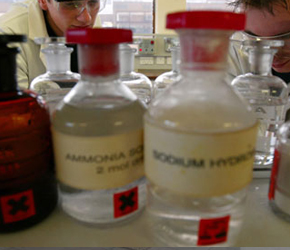Degree in Chemistry Subject and Types
The study of chemistry helps us to understand the complex molecular processes that underscore everything we know about the Earth and the universe. When obtaining a Degree in Chemistry Subject and Types of interest can greatly influence what field you decide to study. When studying chemistry at the collegiate level, you will take course in a wide variety of chemistry fields. These classes will include:
- General Chemistry
- Organic Chemistry
- Physical Chemistry
- Analytical Chemistry
- Inorganic Chemistry
- Biochemistry
Students who find they possess a particular talent or interest in one of these fields can obtain a degree specializing in that field. Students who prefer a more generalized education can choose to pursue a degree in general chemistry. Regardless of what field you choose, a degree in chemistry will open more careers paths in higher paying jobs than most types of liberal arts degrees.
Degree in Chemistry Subject and Types: General Chemistry
General chemistry covers the topics of chemical reactions, bonding, molecular structure, periodic trends, acids and bases, and all other basic theories need understand the field. General chemistry courses will provide you with the foundation necessary to understand more advanced chemistry subjects you will study later on during your education.
Degree in Chemistry Subject and Types: Organic Chemistry
Organic chemistry involves organic compounds, mechanisms, syntheses and spectroscopy. Organic chemistry studies the structure, properties, composition and reactions of carbon-based compounds and hydrocarbons. Individuals with degrees in organic chemistry can find work in research labs, and in sales for chemical companies.
Degree in Chemistry Subject and Types: Physical Chemistry
States of matter, thermodynamics, phase diagrams, electrochemistry and quantum mechanics are all field studied under physical chemistry. American chemist and the discoverer of the covalent bond Gilbert Newton Lewis supposedly once said, “Physical chemistry is everything that is interesting.” Considering that physical chemists attempt to discover the answers behind such fascination questions as how proteins fold into their active state, and to understand how biomolecular motors works you can understand Lewis position.
Degree in Chemistry Subject and Types: Analytical Chemistry
The science of gathering, computing and communicating information about the composition and structure of matter, analytical chemistry seeks to determine what exactly matter is and the amount of it that exists in the universe. Analytical chemists use computer models and statistics to collect data that help assure food and water safety quality is met, that corporations are in compliance with environmental regulations, that aid doctors in diagnosing disease, and that find use in a variety of fields.
Degree in Chemistry Subject and Types: Inorganic Chemistry
Inorganic chemistry studies the structure and bonding of inorganic compounds, molecular orbital theory, coordination compounds, group theory, spectroscopy, and organometallics. Inorganic compounds are ionic compounds consists of cations and anions joined through iconic bonding.
Degree in Chemistry Subject and Types: Biochemistry
The field of study that runs opposite to inorganic chemistry, biochemistry studies amino acids, proteins, polymer, enzymes, nucleic acids, lipids, and metabolic pathways. Biochemistry focuses on the fundamental principles of science to investigate the chemical structure and makeup of life on earth.

